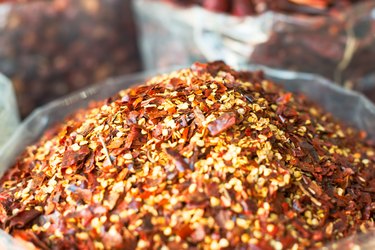
Like turmeric, cayenne pepper has become a staple cure-all spice in many kitchens. While this ingredient can add a kick to any dish and provides some anti-inflammatory effects, the benefits of cayenne pepper are not exactly magic. Although you may have heard that cayenne pepper can help unclog arteries or decrease blood pressure, science has yet to confirm this rumor.
Video of the Day
Video of the Day
Can Cayenne Pepper Unclog Arteries?
Cayenne pepper contains capsaicin, which is responsible for the pepper's undeniable spice, according to the University of Michigan. Often, capsaicin is used topically in cream or lotion form to help relieve pain.
Capsaicin has also been praised for its ability to unclog your arteries and lower blood pressure. However, even the little research supporting these claims only saw results in animal test subjects. So while some findings (like this August 2010 study published in Cell Metabolism conducted on mice) may show an association between capsaicin and decreased blood pressure in animals, these results have not been replicated in humans — which means that you should take them with a grain of salt.
Health Benefits of Cayenne Pepper
Cayenne pepper may not definitively be able to unclog arteries or lower blood pressure — but it may have some digestive benefits worth considering. Capsaicin may be able to stimulate digestion and regulate build up of digestive fluids, according to a January 2016 review published in the Journal of Complementary and Integrative Medicine.
Cayenne pepper has also been long used as a natural anti-inflammatory, according to a March 2018 study published in the European Journal of Translational Myology. When applied topically, cayenne pepper-based treatments has been shown to relieve cramps or muscle pain.
The capsaicin in cayenne pepper may also be used in weight loss. Consuming cayenne pepper can help boost feelings of satiety and curb hunger, according to a June 2014 study published in Appetite. When eaten after dinner, capsaicin can help prevent overeating, the study found. So why not spike freshly squeezed lemonade with some cayenne pepper for a post-dinner treat?
Read more: Redness on the Face After Eating
- University of Michigan: "Capsaicin"
- Cell Metabolism: "Activation of TRPV1 by Dietary Capsaicin Improves Endothelium-Dependent Vasorelaxation and Prevents Hypertension"
- Journal of Complementary and Integrative Medicine: "Phytochemistry and Gastrointestinal Benefits of the Medicinal Spice, Capsicum Annuum L. (Chilli): a Review"
- European Journal of Translational Myology: "Acute Effect of Different Concentrations of Cayenne Pepper Cataplasm on Sensory-Motor Functions and Serum Levels of Inflammation-Related Biomarkers in Healthy Subjects"
- Appetite: "Capsaicin Increases Sensation of Fullness in Energy Balance, and Decreases Desire to Eat After Dinner in Negative Energy Balance"